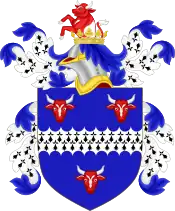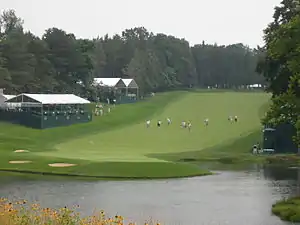Devereux Emmet | |
|---|---|
 Emmet, c. 1915 | |
| Born | December 11, 1861 |
| Died | December 30, 1934 (aged 73) |
| Nationality | American |
| Alma mater | Columbia University |
| Occupation | Architect |
| Spouse | Ella B. Smith |
| Children | 2 |
| Parent(s) | William Jenkins Emmet and Julia Colt Pierson |
| Projects | Bethpage State Park, 1923 |
| Design | Congressional Country Club (Blue), 1924 |
Devereux Emmet (December 11, 1861 – December 30, 1934) was a pioneering American golf course architect who, according to one source, designed more than 150 courses worldwide.[1]
Early life
Devereux Emmet was born in Pelham, New York,[2] on December 11, 1861, one of eight children of William Jenkins Emmet and Julia Colt Pierson.[3] He was the great-grandson of Thomas Addis Emmet.
College and marriage

Emmet graduated from Columbia University in 1883;[4] in 1889 he married Ella B. Smith in an elaborate wedding at her home in New York City.[5] Miss Smith, born in 1858, was the daughter of Judge J. Lawrence Smith and a niece of Alexander Turney Stewart. Ella's sister Elizabeth "Bessie" Springs Smith was the wife of architect Stanford White.[6] The couple had two children, Richard Smith Emmet (born October 1889) and Devereux Emmet, Jr. (born January 1897).[7]
Golf course design career
On a vacation in England he spent time with his friend, Charles B. Macdonald, who was measuring British golf courses in preparation for the design of the National Golf Links of America. Emmet's first design was Island Golf Links, a predecessor of Garden City Golf Club.[6] A friend of his remarked:
Emmet could not possibly conceive of any other use to which any given piece of real estate could be put except to lay out golf links on it.[2]
In 1924 he hired Alfred H. Tull as a design associate, and in 1929 made him a partner in the firm of Emmet, Emmet and Tull. The Tull-Emmet partnership continued until Emmet's death in 1934.[8]
Amateur golf
Emmet was a talented amateur golfer. He made the quarter-finals of the 1904 British Amateur and won the Bahamas Amateur at the age of 66.[6] In 1916, after he won the father-son tournament at Sleepy Hollow Country Club with Devereux Emmet, Jr., the United States Golf Association instituted the so-called architects rule that barred golf course architects from competing as amateurs in tournaments.[9]
Death and legacy
Devereux Emmet died in Garden City, New York, on December 30, 1934.[4]
Courses designed

Emmet designed many of his courses in an era of wooden-shafted clubs. Because the holes are often short by current standards many of his designs have since been reworked.
Note: Dates indicate when the course opened.
Note: This is a partial list, portions of which were taken from WorldGolf.[10]
- Belmont Hills Country Club, St Clairsville, Ohio, 1924
- Bethpage State Park (Green), Farmingdale, New York, 1923
- Congressional Country Club (Blue), Bethesda, Maryland, 1924
- Congressional Country Club (Gold), Bethesda, Maryland, 1924
- (remodeled by George Fazio and Tom Fazio in 1977 and by Arthur Hills in 2000)
- Hartford Golf Club (Blue, Green), West Hartford, Connecticut, 1914
- Bonnie-Briar Country Club, Larchmont, New York, 1921
- Bedford Golf and Tennis Club Bedford, New York, 1891
- Brentwood Country Club, Brentwood, New York, 1925
- Capital Hills at Albany, Albany, New York, 1928
- Cherry Valley Club, Garden City, New York, 1916
- Coonamessett Country Club Falmouth, Massachusetts (now Cape Cod Country Club)
- Copake Lake Country Club, Craryville, New York, 1921 ([11]; [12]; although there are claims that Devereux Emmet was never at Copake Lake Country Club)
- Dudley Hill Golf Club (9 holes), Dudley, Massachusetts, 1926
- Edison Club, Rexford, New York, 1925[13]
- Engineers Country Club, Roslyn Harbor, New York, 1921
- (originally designed by Herbert Strong, remodeled by Devereux Emmet in 1921)
- Country Club of Farmington, Farmington, Connecticut, 1924[14]
- Garden City Golf Club, Garden City, New York, 1899[15] (later remodeled by Walter Travis)
- Leatherstocking Golf Course, Cooperstown, New York, 1909
- Mohawk Golf Club (East), Schenectady, New York, 1907
- Glen Head Country Club, Glen Head, New York, 1920s
- Hartford Golf Club (Green, Red), West Hartford, Connecticut, 1914
- Greenacres Country Club, Lawrenceville, New Jersey, 1932
- Green Meadow Club, Rye, New York, 1917 - known today as Willow Ridge Country Club. The Green Meadow Golf Club was an offshoot of The Apawamis Club and formed in 1917 directly adjacent to Apawamis but with frontage on North Street. In fact, in 1927 the two clubs considered consolidating.[16][17]
- Hampshire Country Club, Mamaroneck, New York, 1927
- Huntington Country Club, Huntington, New York, 1910
- Huntington Crescent Club, Huntington, New York, 1914
- (renovated by Devereux Emmet and Alfred H. Tull in 1931)
- Keney Park Golf Club, Hartford, Connecticut, 1927
- Lake Isle Country Club, Eastchester, 1926
- Leewood Country Club (Eastchester (town), New York) 1922
- Long Hill Country Club, East Hartford, Connecticut, 1930
- Mahopac Golf Club, Mahopac, New York, 1893
- Manchester Country Club, Manchester, Connecticut, 1917
- (with Tom Bendelow)
- McGregor Links Country Club, Saratoga Springs, New York
- Mechanicville Golf Club, Mechanicville, New York, 1909
- Nassau Country Club, Glen Cove, New York, 1896
- Oliver D. Appleton Golf Course at St. Lawrence University, Canton, NY 1926 (Original 9 holes)
- Pelham Country Club, Pelham Manor, New York, 1908
- Pomonok Country Club, Queens, New York, 1921 – closed in 1949
- Powelton Club, Newburgh, New York, 1892
- Radisson Cable Beach & Golf Resort, Commonwealth of the Bahamas, 1929
- Eisenhower Park Golf Course (Red), East Meadow, New York, 1914
- Hartford Golf Club (Red, Blue), West Hartford, Connecticut, 1896
- (with Donald Ross)
- Riddell's Bay Golf and Country Club, The Islands of Bermuda, 1922
- Ridgewood Country Club, Danbury, Connecticut, 1927
- Rockaway River Country Club, Denville, New Jersey, 1923
- Rockville Links Club, Rockville Centre, New York, 1924
- Rye Golf Club, Rye, New York, 1921 [18][19]
- Salisbury Golf Club, East Meadow, New York
- Schuyler Meadows Club, Loudonville, New York, 1928
- Seawane Country Club, Hewlett Harbor, New York, 1927
- St. George's Golf & Country Club, East Setauket, New York, 1917
- St. Mary's Country Club, Saint Mary's, Pennsylvania, 1924
- Wee Burn Country Club, Darien, Connecticut, 1902
- Mohawk Golf Club (West), Schenectady, New York, 1903
- Wheatley Hills Golf Club, East Williston, New York, 1913
- (remodeled by Devereux Emmet and Alfred Tull in 1931)
- Wheeling Country Club, Wheeling, West Virginia, 1902
- Wheeling Park Golf Course, Wheeling, West Virginia, 1926
References
- ↑ "A Brief History". Schuyler Meadows Club. Retrieved June 5, 2013.
- 1 2 Jackson (ed), A.V.Williams; Peele (ed), Robert (1911). A History of the Class of Eighteen Hundred and Eighty-Three of Columbia College. New York: Irving Press. p. 42.
{{cite book}}:|last1=has generic name (help) - ↑ The Yale Forest School (1913). Biographical Record of the Graduates and Former Students of the Yale Forest. New Haven, CT: The Yale Forest School. p. 39.
- 1 2 "Devereux Emmet Golf Architect Died on Sunday" (PDF). The Pelham Sun. January 4, 1935. Retrieved June 5, 2013.
- ↑ "At her Father's Home" (PDF). New York Times. January 27, 1889. Retrieved June 5, 2013.
- 1 2 3 "Golf Course". Riddell's Bay Golf & Country Club. Retrieved June 5, 2013.
- ↑ Coates, H.T (1904). Woodhull Genealogy: The Woodhull Family in England and America. Philadelphia: Henry C. Coates & Co. p. 366.
- ↑ Ed Oliver Golf Club. "Course Architects: About The Architects". Archived from the original on January 1, 2014. Retrieved June 5, 2013.
- ↑ "Emmet Takes Issue With U.S.G.A. Rule" (PDF). The New York Times. February 25, 1917. Retrieved May 19, 2018.
- ↑ "Devereux Emmet". WorldGolf. Retrieved June 5, 2013.
- ↑ https://openlinksgolf.com/architect-profiles/architect-profile-devereux-emmet/
- ↑ chrome-extension://efaidnbmnnnibpcajpcglclefindmkaj/https://www.copakecountryclub.com/docs/The%20Met%20Golfer%20Article%20for%20Website%20.pdf
- ↑ "The Edison Club". Time Union. Retrieved June 5, 2013.
- ↑ "The CCF Golf Course". Archived from the original on 2011-04-04. Retrieved June 5, 2013.
- ↑ Mingay, Jeff (2008). Golf Architecture: A Worldwide Perspective, Volume 4. Pelican Publishing. p. 13. ISBN 9781589806160.
- ↑ "APAWAMIS AND GREEN MEADOW COUNTRY CLUBS MAY CONSOLIDATE". The Rye Chronicle. Rye, New York, New York. March 6, 1918.
- ↑ "Hughes Apawamis Professional, Will go to Green Meadow". The Evening Tribune. New York, New York. March 6, 1918.
- ↑ "New Rye Country Club Rushing Work of Construction of 18 Hole Course". New York Evening Post. August 13, 1921.
- ↑ "Meeting Here Tonight of the New Rye Club". The Daily Argus. July 14, 1921.